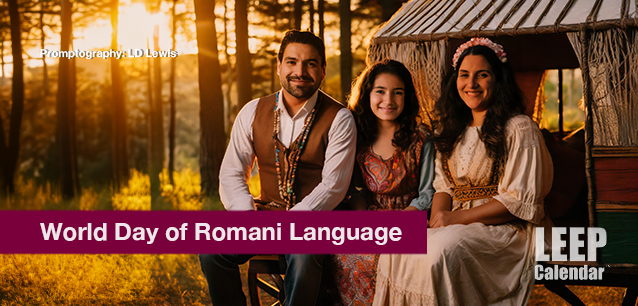 AD
AD
Today is: November 01
Scroll to explore events active on this date.
Additional Events on LEEP
LEEP INK FEATURES

August? Absolutely!
In August, we live through the Dog Days of Summer. It's hot and often humid, and those who can leave for better climates do. Down south, winter is in full force. August is also known as "the ...

In The Heat of July: July 2025 Events
Is it hot enough (or cold enough if you're below the equator) for you yet? There is actually a day for that! Like every month, I pick a diverse collection of events you may or may not know about. This ...

May Blooms: Events in May 2025
Along with October, May is one of the most densely packed months of the year. It's before the summer humidity and the last whole month of the school year. The weather is warming in t...
About World Day of Romani Language
India , Family & Friends
Civil Rights
Ends: Nov 05, 2025
DESCRIPTION:
World Day of Romani Language acknowledges the Romani language, an integral part of the cultural heritage of the Romani people. It raises awareness about the Romani people, promoting the preservation and use of this Indian-based language and the unique culture of the people.
WHO ARE THE ROMANI?
The Romani people, or Roma (or Gypsies—due to a misalignment as coming from Egypt during the wane of the Roman Empire), have a complex and rich history spanning over a millennium.
The Roma are an itinerate people from the northern regions of the Indian subcontinent who began migrating to Europe and other parts of the world around the 11th century. Linguistic and genetic evidence points to their origin in India, particularly in today's Rajasthan, Punjab, and Haryana regions.
As a distinct cultural group, they faced numerous challenges, often marked by discrimination and hardship. As they migrated through the Byzantine Empire into Europe, they became known for their nomadic lifestyle. This trait would become both a cultural hallmark and a source of stereotype and misunderstanding.
In Europe, the Roma initially found themselves welcomed, but this reception quickly soured due to their darker complexion and mystical traditions, causing them to be marginalized and persecuted. This mistreatment reached a devastating peak during World War II with the Porajmos or the Romani Holocaust; twenty-five percent of their global population, 550,000 people, and an equivalent percentage of the Jewish population persecuted at the same time were exterminated by the Nazis. Today, the Roma are Europe's most significant ethnic minority, with communities also found in the Americas and some parts of the Middle East and North Africa.
Despite these adversities, the Roma have preserved a rich cultural heritage, including a distinct language and music, art, and craftsmanship traditions. With its various dialects, the Romani language remains a central element of their cultural identity.
THE ROMANI LANGUAGE
UNESCO World Day of Romani Language aims to counteract the marginalization and discrimination of the Romani community and their language. The Romani language began as a subset of Sanskrit but reflects influences of Persian, Turkish, Eastern European, and localized tribal languages within its words and structure. However, the language is not monolithic. It includes multiple dialects and is an essential part of the identity and cultural expression of the Romani people. The language has evolved over centuries, reflecting a history of over 1400 years of migrations from India through Persia, Turkey, and finally, Europe. It is a testament to the resilience of the Romani community.
The awareness day includes activities and events organized globally, such as linguistic conferences, cultural festivals, educational workshops, and exhibitions designed to educate the public about the history and significance of the Romani language. A primary goal of this day is to promote the inclusion of the Romani language in educational systems, particularly in regions with significant Romani populations. Inclusion preserves the language and ensures Romani children's educational rights.
The day also highlights language preservation challenges for many unique cultural communities, including the need for more official recognition and support in many countries. Today, advocacy often focuses on urging governments and international organizations to take concrete steps to safeguard the Romani language and culture.
UNESCO World Day of Romani Language is a significant observance that not only celebrates the linguistic heritage of the Romani people but also advocates for the rights and recognition of one of Europe's largest minority groups. It underscores the importance of linguistic diversity and the need to preserve and promote minority languages as part of the world's rich cultural tapestry.
VIDEOS
SUPPORTING DOCUMENTS
Currently, this event does not have supporting documents.
ADDITIONAL IMAGES
Currently, this event does not have supporting images.
Where would you like to go now?
 AD
AD


/footer-logo.svg)
